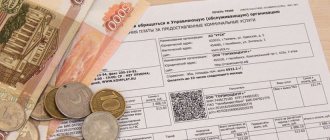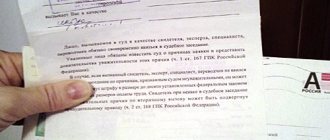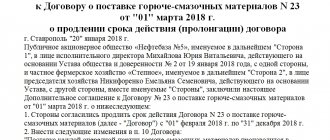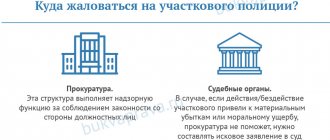Obligation to pay rent
Payment for residential premises includes the costs of maintaining the house and utilities, as well as costs for actually consumed resources (electricity, gas, heating, etc.).
Legislative regulation of payment for housing is carried out:
- Housing Code;
- Government Decree No. 354;
- regional regulations.
Section 7 of the Housing Code of the Russian Federation determines the structure and amount of payment for housing, Appendix No. 2 to Resolution No. 354 contains the basic formulas for calculating the amount of payment for each component of housing and communal services, and regional laws determine the tariff for each type of utility service every six months.
Owners are required to pay for the maintenance of housing and utilities from the moment of registration of the right to living space in Rosreestr (Clause 2 of Article 153 of the Housing Code of the Russian Federation).
Persons living in municipal housing on the basis of a social tenancy agreement, as well as their relatives, are required to pay fees for housing and communal services on an equal basis with the owners of the premises. With the exception of the fee for major repairs, this is paid by the municipal owner.
Blog
The problem of debts for residential premises of the municipal housing stock has been facing the UO for a long time. Often, the owner (local self-government self-government) does not fulfill the obligation to pay for housing and communal services, citing the fact that the premises have been transferred for use to other persons and the obligation to pay lies with the latter.
A similar situation arose with the management organization Talnakhbyt LLC.
In 2015, an agreement for the management of the controversial apartment building was concluded between the Administration of the city of Norilsk, which is the owner of the residential and non-residential premises of the apartment building, and the management authority.
Meanwhile, the Administration did not fulfill its obligations to pay for housing and communal services provided. With a claim dated February 26, 2020, the Administration was asked to repay the resulting debt as soon as possible.
In response to the claim, the Administration of Norilsk indicated that during the disputed period, residential premises No. 28 were transferred under a lease agreement to the OktaStroy company, therefore, during the disputed period, the obligation to pay fees for the maintenance and current repairs of common property in an apartment building was assigned to the tenant .
Not agreeing with these arguments, the Management Office filed a claim against the municipal institution of the administration of the city of Norilsk to recover 48,301.77 rubles in debt for services rendered for the maintenance and routine repairs of common property in an apartment building and 1,175.53 rubles as a penalty for late payment.
During the consideration of the case, the administration indicated that in the period from January 21, 2013 to January 21, 2020, residential premises No. 28 were transferred under a lease agreement to OktaStroy LLC, therefore, during the specified period, the obligation to pay fees for the maintenance and current repairs of common property in an apartment building are assigned to the tenant. At the same time, the obligation to pay fees for the maintenance and current repairs of common property in an apartment building for the period from 01/21/2020 to 01/31/2020 in the amount of 4,464.73 rubles. executed by the defendant.
Clause 2.2.5 of the said agreement obliges the tenant to, within five working days from the date of state registration of the agreement, conclude a management agreement for the apartment building with the management organization chosen by the owners of the premises in the apartment building, the homeowners' association.
The debt for the services provided by the management for the maintenance of the common property of the apartment building arose in the period from 08/01/2019 to 01/31/2020.
It is noteworthy that the Tenant entered into a management agreement with the management company, but terminated it early - from 08/01/2019.
The Arbitration Court of the Krasnoyarsk Territory, by decision dated July 15, 2021 in case No. A33-15359/2020, satisfied the requirements of the UO in full, indicating that from a systematic interpretation of the rules enshrined in Articles 210, 249 of the Civil Code of the Russian Federation and Articles 39, 153, 154, 158 of the Housing Code of the Russian Federation, we can conclude that the law directly establishes the obligation of the owner of premises in an apartment building to bear the burden of expenses for the maintenance and repair of common property in an apartment building, expenses for utility services, by paying for the residential premises.
The trial court also noted the following:
“By virtue of paragraph two of paragraph 3 of Article 308 of the Civil Code of the Russian Federation, an obligation can create rights for third parties in relation to one or both of its parties only in cases provided for by law, other regulations or agreement of the parties. The current legislation does not contain rules that entail the obligation of the tenant to pay for utility services to the third party providing them (the provider of such services, the resource supplying organization).
The tenant's obligation to maintain the property in good condition and bear the costs of maintaining the property (clause 2 of Article 616 of the Civil Code of the Russian Federation) is established in relations with the lessor, and not with the provider of the above services or the resource supply organization, which is not a party to the lease agreement.
The management organization (provider of public services, resource supplying organization), in the absence of an agreement concluded with it, does not have the opportunity to exercise control over which person actually uses the non-residential premises, including on the basis of a lease agreement.
In such a situation, the general rule applies that in the absence of an agreement between the tenant of non-residential premises and the provider of services (resource supply organization), concluded in accordance with current legislation and the terms of the lease agreement, the obligation to pay for such services lies with the owner (lessor) of the non-residential premises.
Considering the fact that the agreement for the management of an apartment building with the tenant of the premises dated 04/16/2013, concluded between the management company and the tenant of premises No. 28, was terminated on 08/01/2019, the court, taking into account the above legal regulation, rejects the argument stated by the defendant that he has no obligation for payment during the period from 01.08.2019 to 20.01.2020 of payment for the maintenance of the common property of an apartment building...”
The appellate court agreed with the arguments of the first instance court; the decision of the Third Arbitration Court of Appeal dated September 15, 2021 No. 03AP-4311/20 in case No. A33-15359/2020 was upheld.
The administration did not stop and filed a cassation appeal, following the consideration of which the Arbitration Court of the East Siberian District saw in the actions of a person who was not a party to the dispute (the tenant) an abuse of rights and made an unexpected decision: the judicial acts of the first and appellate instances were canceled, in satisfaction the claim was denied.
Canceling judicial acts, the Arbitration Court of the East Siberian District in the Resolution of December 14, 2021 No. F02-6002/20 in case No. A33-15359/2020 indicated the following:
“In satisfying the stated requirements, the courts of first and appellate instances proceeded from the validity of the claim in law and in size. At the same time, the courts came to the conclusion that it is the administration, as the owner of the residential premises, by virtue of Articles 210, 249 of the Civil Code of the Russian Federation, Articles 39, 153, 154, 158 of the Housing Code of the Russian Federation, which is obliged to pay for the services of the management authority for the period from 01.08.2019 to 20.01.2020, since the agreement for the management of an apartment building, concluded between the tenant - the OktaStroy company and the management company, dated 04/16/2013, was terminated by the parties on 08/01/2019 by agreement.
Meanwhile, the conclusions of the courts were made with a significant violation of the norms of substantive law due to the following.
According to Article 210 of the Civil Code of the Russian Federation, Article 153 of the Housing Code of the Russian Federation and taking into account the legal position of the Presidium of the Supreme Arbitration Court of the Russian Federation, specified in the resolution of April 12, 2011 No. 16646/10, tenants of residential premises of the state or municipal housing stock from the moment of conclusion of the corresponding Rental agreements are required to pay rent and utilities on time and in full.
In addition, the tenant is obligated to pay the cost of services provided and work performed for the proper maintenance and repair of common property if an agreement is concluded directly with the management organization.
As a general rule, relations arising from an agreement can only be extended to the parties to this transaction. An obligation does not create obligations for persons not participating in it as parties (clause 3 of Article 308 of the Civil Code of the Russian Federation).
Accordingly, the contractual terms for terminating the management agreement for an apartment building dated April 16, 2013, agreed upon between the tenant and the management company, cannot automatically apply to relations with the owner of the residential premises, since the latter is not a party to this agreement.
In accordance with Article 10 of the Civil Code of the Russian Federation, the exercise of civil rights solely with the intention of causing harm to another person, actions in circumvention of the law for an unlawful purpose, as well as other deliberately dishonest exercise of civil rights (abuse of law) are not allowed.
As can be seen from the case materials, residential premises No. 28 were transferred to the owner from the tenant only on 02/07/2020 (Act of acceptance and transfer of residential premises dated 02/07/2020).
Consequently, in the presence of remaining obligatory legal relations under the lease agreement, the tenant’s actions to terminate the management agreement for an apartment building are an abuse of right, which is aimed at worsening the position of the owner of the residential premises. Under the terms of the agreement, the amount of rent was determined without taking into account the costs of maintaining the common property of the apartment building, the obligation to pay for which was assigned to the tenant.
Taking into account the specific circumstances of the case and if there is an established fact that the tenant is in the residential premises, there are no grounds for imposing on the owner the obligation to pay for services for the maintenance of the common property of the apartment building during the disputed period of time...”
In order to protect its interests, the management company had to appeal to the Supreme Court of the Russian Federation, which, in its Ruling dated September 14, 2021 No. 302-ES21-4060 in case No. A33-15359/2020, pointed out the following fundamental points:
“The actions of the tenant aimed at terminating the management agreement for the apartment building dated April 16, 2013 were assessed by the cassation court as an abuse of right, noting that these actions were aimed at worsening the situation of the owner of the residential premises.
The panel of judges cannot agree with these conclusions of the district court due to the following.
By virtue of paragraph two of paragraph 3 of Article 308 of the Civil Code of the Russian Federation, an obligation can create rights for third parties in relation to one or both of its parties only in cases provided for by law, other regulations or agreement of the parties.
The tenant’s obligation to maintain the property in good condition and bear the costs of maintaining the property (clause 2 of Article 616 of the Civil Code of the Russian Federation) is established in relations with the lessor, and not with the utility service provider or resource supply organization, which is not a party to the lease agreement.
In such a situation, the general rule applies that in the absence of an agreement between the tenant of non-residential premises and the provider of services (resource supply organization), concluded in accordance with current legislation and the terms of the lease agreement, the obligation to pay for such services lies with the owner (lessor) of the non-residential premises.
This legal position is reflected in the Review of Judicial Practice of the Supreme Court of the Russian Federation No. 2 (2015), approved on June 26, 2015 by the Presidium of the Supreme Court of the Russian Federation.
Thus, since during the disputed period there was no direct agreement between the tenant and the company on the tenant’s participation in the costs of maintaining and routine repairs of common property in the apartment building, the courts of first and appellate instances reasonably satisfied the company’s demands for the administration as a representative of the property owner.
The district court, concluding that the tenant had abused his rights, actually established circumstances that were not established in the decision or resolution or were rejected by the court of first instance or appeal, thereby violating the requirements of Part 2 of Article 287 of the Arbitration Procedure Code of the Russian Federation...”
As a result, everything ended well for the management company; the debt for the disputed period was collected from the administration in its favor. The decision of the Arbitration Court of the East Siberian District dated December 14, 2020 in case No. A33-15359/2020 was canceled by the judicial panel, and the judicial acts of the first and appellate instances were upheld.
provides legal services to management companies and homeowners associations.
All the necessary information about the service is here .
Who pays for housing and communal services if the apartment is not registered?
When purchasing housing from a developer, the apartment can be obtained for actual use from the moment the house is put into operation, but ownership can only be registered several months later, after registration of cadastral documents.
Payment for utilities in this case is regulated by a share participation agreement or a housing purchase agreement from the developer.
The developer, within 3 months from the date of delivery of the house, selects a management company based on a competition, and this management company pays for utilities while simultaneously meeting the following conditions:
- the house was put into operation;
- the buyer of the apartment has not yet signed the transfer and acceptance certificate;
- The management company has completed accepting the house from the developer under an agreement with him.
If the management company has not yet been selected and the apartments have not been transferred to buyers for use, the developer must pay for the maintenance of the house.
Regardless of the date of ownership, the buyer who accepted the apartment from the developer and signed the acceptance certificate bears full responsibilities for paying for the maintenance of the house and housing and communal services, according to paragraphs. 6 paragraph 2 art. 153 of the Housing Code of the Russian Federation, since payment is made not for the existence of property rights, but for the services consumed.
It is important to take into account that if the buyer, during the actual acceptance of the apartment, has any complaints about the compliance of its characteristics with the parameters specified in the contract with the developer, then such a buyer has the right not to sign the acceptance certificate until the registration of the cadastral document. Payment for services for the maintenance of the house is made by the developer or management company (if it has already been selected).
The discrepancy between apartment parameters most often concerns the height of window openings and ceilings, and the length of walls. If such discrepancies are detected, you can avoid paying utility bills before registering the apartment as follows:
- Refuse to sign the acceptance certificate and demand that a report on the actual parameters of the housing be drawn up.
- Contact the developer with a completed report and submit an application to change the data about the apartment in accordance with its actual parameters.
- Sign the acceptance certificate after the developer changes its conditions.
As a rule, the developer makes changes to the acceptance certificate after the registration of the cadastral document, which is drawn up immediately before registering the buyer’s right to an apartment in Rosreestr.
The keys to the apartment remain with the buyer during the registration of the cadastral document (1-2 months), and utility payments are made by the developer.
In addition, if, after the changes made when preparing the cadastral document, the actual area of the apartment turns out to be less than stated in the contract, the buyer can not only reduce the amount of payment for the maintenance of the house, but also demand a recalculation of the purchase amount.
Features of object transfer
At the time of provision of the premises, the subject (tenant/tenant) is given keys and documentation confirming the proper condition. The securities include, in particular:
- Sanitary and hygienic certificate.
- Technical certificates for equipment installed in the premises.
- Rules for operating devices.
The tenant/tenant inspects the property. If there are no comments, the parties draw up an act. From the moment it is signed, the premises are recognized as transferred for use. Accordingly, it can already be used.
Nuances
The subject to whom the premises are transferred in accordance with the lease agreement has the right to refuse to accept the property and move into it if its condition turns out to be inadequate or unsuitable for habitation. In this case, it would be incorrect to impose the obligation on the person to pay utility bills. If the subject who entered into the agreement unreasonably refuses to accept the premises, this fact is recorded in a special act. The document must reflect that the person, without good reason, refuses to be accommodated and sign the necessary papers. In such a situation, the obligation that is enshrined in the RF Housing Code in Art. 153, would arise from the moment of execution of the special (commission) act. Meanwhile, the legislation does not contain regulations containing requirements for the process of transferring premises. It seems that this is a fairly significant gap in the norms that needs to be filled.
Expert opinion
Due to the lack of rules regulating the process of providing premises to a tenant, a number of lawyers propose using the provisions of Article 611 of the Civil Code by analogy. Experts believe that it is quite logical to assign the obligation to pay for premises and housing and communal services to the subject from the moment the object is provided to him. Moreover, in practice, as a rule, what happens is that a rental agreement is concluded, and the living space is transferred later.
However, Art. 153 establishes another rule. It seems that the logic of the legislator is to encourage the tenant to eliminate any obstacles on his part to move into the premises provided to him under the contract and use it for its intended purpose. If, after the agreement is drawn up, the landlord for some reason delays the transfer of the property, then the second party to the transaction may well demand that no fees be charged for the period during which he could not use the living space. If a dispute arises between the parties, which can only be resolved through legal proceedings, the authority considering the case must take into account the specific circumstances and determine the exact date on which the object was provided to the tenant. When resolving a conflict, the court should be guided not only by general, but also by special provisions governing obligations.
Openness of the list
The purpose of the rules enshrined in part of the second norm under consideration is to determine the moment when obligations to pay for housing and communal services and premises arise. In this regard, it does not disclose a complete list of persons. Accordingly, the rules enshrined in part two should be applied in conjunction with other norms of the Code establishing the circle of obligated subjects. These, in particular, include legally capable (fully or partially) relatives of the owner/tenant (under a social lease agreement) and co-tenants.
Cooperative members
They receive the right to premises not in accordance with the contract, but on the basis of the association’s fulfillment of its obligations. As stated in Article 124 of the Code (Part 2), in order to move in a member of the cooperative, the general meeting makes a decision on this. Accordingly, the obligation enshrined in the RF Housing Code in Art. 153, arises at the moment of approval of the specified act by all members of the association. According to experts, it would be logical to provide that payment for premises provided to a member of a housing cooperative should be made by him not from the date of the decision, but after the transfer of the property according to the relevant act.









